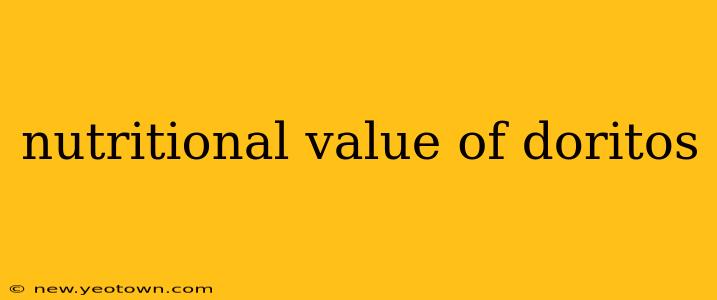Doritos. The name conjures images of vibrant colors, bold flavors, and that satisfying crunch. But beyond the playful marketing and addictive taste, lies a nutritional profile that's… well, let's just say it's a complex story. This isn't about demonizing a beloved snack; it's about understanding what's actually in that bag of cheesy goodness and making informed choices. Let's dive into the crunchy details.
What are the main ingredients in Doritos?
The core ingredients of Doritos vary slightly depending on the specific flavor, but generally, they include corn flour, vegetable oil (often a blend of sunflower, corn, and/or cottonseed oil), maltodextrin (a carbohydrate), cheese powder (a complex blend of various ingredients including cheese, whey, salt, and other flavor enhancers), salt, and various seasonings and spices. The "cheese" flavor is often far removed from real cheese, relying heavily on artificial flavors, colors, and preservatives to achieve that distinctive taste.
How many calories are in a serving of Doritos?
A typical serving size (about 1 ounce or 28 grams) of Doritos packs around 140-160 calories. However, let's be honest, a single serving rarely satisfies. It's easy to consume far more than that in one sitting, quickly multiplying the calorie count. That seemingly innocent bag holds a significant caloric punch.
What are the macronutrients in Doritos?
Doritos are primarily carbohydrates, deriving their energy from corn. They also contain a moderate amount of fat, mostly from vegetable oils. Protein content is relatively low. This high-carbohydrate, moderate-fat profile contributes to their satisfying crunch and intense flavor, but also to their less-than-ideal nutritional profile.
Are Doritos a good source of any vitamins or minerals?
The answer is a resounding "not really." While Doritos contain trace amounts of certain vitamins and minerals, they are not a significant source of any essential nutrients. Your body won't derive any significant nutritional benefits from consuming them. For vitamins and minerals, you're far better off focusing on whole, unprocessed foods like fruits, vegetables, and lean protein sources.
What are the potential health concerns associated with eating Doritos?
The high sodium content in Doritos is a major concern, contributing to high blood pressure and related health problems if consumed regularly in large quantities. The saturated and trans fats, though present in smaller amounts, still add to your overall fat intake and can contribute to negative health outcomes if consumed excessively. Finally, the high levels of processed ingredients and artificial flavors are not ideal for long-term health.
Are there healthier alternatives to Doritos?
Absolutely! There are many healthier snack options available. Consider air-popped popcorn, baked veggie chips, or even homemade baked tortilla chips made with whole-wheat tortillas. These options often contain fewer calories, less fat and sodium, and more fiber than Doritos.
Can Doritos be part of a healthy diet?
In moderation, perhaps. One small serving occasionally won’t derail your health goals, but making Doritos a regular part of your diet is not recommended. It's crucial to prioritize whole, unprocessed foods for optimal nutrition and long-term health. Think of Doritos as an occasional indulgence, not a dietary staple. Balancing your nutritional intake is key.
Ultimately, the nutritional value of Doritos is relatively low. While satisfying in the moment, they should be considered an occasional treat, not a regular part of a healthy diet. Choose wisely, and remember that a balanced approach to nutrition is always the best path to well-being.

